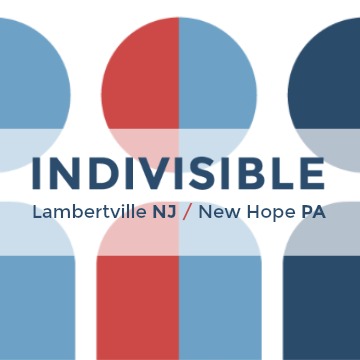On Friday, Jan. 19, the Federal Energy Regulatory Commission gave its approval to the PennEast pipeline. It’s a big setback, but the pipeline can’t be built without approval from the New Jersey Department of Environmental Protection. New Jersey already rejected an application from the PennEast Pipeline Company once. If enough of us keep raising our voices, we can show the Department of Environmental Protection that we don’t want a huge pipeline destroying protected open space and some of our cleanest waterways.
What are you gonna do?
“The fight’s quixotic,” my friends asserted. “It’s foolish to think you can make a difference.”
“But if this pipeline gets built our neighbors will lose their land and our town could be flooded!!” I persisted.
“All the same, Michael, you can’t stop a pipeline!”
“I think it’s a cause worth fighting for, don’t you?”
Thus ran the debate when I joined the fight to stop the PennEast pipeline. It was the first time I’d gotten involved in a political cause.
My involvement started with a conversation, where I learned that the pipeline’s planned route goes right by Lambertville City’s reservoir, which has a dam rated high risk and is surrounded by granite, which will require blasting for the pipeline. The prospect of our city being flooded got my attention. I discovered that our neighbors in Hunterdon and Mercer counties could have their land taken away and would be living in the pipeline’s blast zone. I joined Homeowners Against Land Takeaway (HALT) and its Board of Trustees, questioned officials and candidates running for office, and do my best to keep the community informed.
As I got involved in the fight, I came to understand some ugly things. The bad news is:
Lesson 1: Five companies are investing in PennEast—New Jersey Resources, South Jersey Industries, Southern Company Gas, Spectra Energy Partners, and UGI Energy Services. They provide natural gas to customers and all proclaim the purpose of the pipeline is to provide low-cost gas to New Jersey residents. However, the natural gas market is flat. Their challenge is: How can we create a growth story for Wall Street to keep growing our stock prices? The answer? Build a pipeline! Why? Because the federal government, through the Federal Energy Regulatory Commission (FERC), guarantees a 14 percent profit to companies that build pipelines. When was the last time you were guaranteed a 14 percent profit?
The Securities and Exchange Commission (SEC) filings of all five companies investing in PennEast state that New Jersey has enough natural gas to satisfy market needs through existing pipelines. The state Division of Rate Counsel, the agency that monitors natural gas supply and demand, concludes the same. That federally guaranteed 14 percent profit and its expected impact on stock prices is the sole reason for the PennEast pipeline. And the consequences for the little guy in cold cash? That 14 percent big corporate profit will come out of the pockets of ratepayers—you and me. So much for the myth of low-cost gas for New Jersey residents!
Lesson 2: In grade school we’re taught that we’re a nation ruled by laws, not men. This, however, is only a half-truth. Under federal law, FERC guarantees a 14 percent profit, conditionally approves incomplete environmental applications, and enables eminent domain, allowing the seizure of citizens’ land. FERC enforces the law, as it interprets it. In the case of PennEast, FERC’s interpretation includes approving an environmental application so incomplete that it has been rejected by the U.S. Army Corps of Engineers and the state Department of Environmental Protection (NJ DEP). Nevertheless, the NJ DEP can use the federal Clean Water Act to stop pipelines. But here comes the hitch: NJ DEP can only stop a pipeline with the governor’s approval. Enforcement, in practice, is the governor’s decision.
And the good news? New Jersey has a new governor, Phil Murphy. Murphy stated on videotape in Lambertville last year that the PennEast pipeline makes no sense economically or environmentally, and should be stopped. Suddenly the “quixotic” fight looks winnable!
Who’s writing and enforcing our laws? Any law that enables a federal agency that (at best case) is influenced by the industry it regulates, or (at worst case) is controlled by that very industry is suspect. Yet this worst-case scenario is exactly what we have in FERC. The Clean Water Act is meant to protect our water and yet one governor can ignore it, and the next can chose to enforce it or not—it’s up to the governor.
We must enforce existing laws that protect us and our children, and fight to pass new laws that benefit future generations. This is what we should stand for with renewed vigilance. The level of vigilance for any of us—the effort we put into educating ourselves, becoming involved in our communities, and voting—is a matter of temperament.
Maya Van Rossum, the Delaware Riverkeeper, and her organization, the Delaware Riverkeeper Network, have vigilantly worked to protect the Delaware River for many years, fighting the negative impacts of state and federal policies on the health of the Delaware River and its surrounding communities.
Maya has recently proposed a Green Amendment to the New Jersey constitution (see her inspiring site forthegenerations.org). Now, more than ever, with one of our major political parties denying climate change, we need to join her and other like-minded citizens to ensure our right to a clean environment, clean air, and clean water. If we don’t write and pass the laws we want, the fossil fuel and chemical companies will write the laws they want—laws that guarantee 14 percent profits and allow corporations to seize or pollute our lands.
In times like these, when the White House talks about “alternate facts” and the influence of dark money permeates our lives, it’s easy to feel discouraged, depressed, and alone. I, for one, have discovered that it helps a great deal to focus on a cause and join forces with others, like HALT and the Delaware Riverkeeper Network, that are fighting to protect our rights and improve our lives.
“What are you gonna do?” can be a resigned expression we use to evoke a sense of powerlessness, or a question we ask ourselves to determine how we can help to make our community a better place. Which will it be for you?
Even if you’re not an active fighter, you can—and should— be an active voter. Important primaries are coming up in New Jersey in June, and elections will be held in November. If you aren’t inclined to get out and fight, get out and vote. If you are inclined to fight, there is plenty of work to do and organizations for every candidate—Indivisible, the Delaware Riverkeeper Network, and other groups support causes and candidates.
The fossil fuel industry can fund candidates, but it cannot win if we vote its candidates out. Voting is the one thing all citizens can do. By voting for candidates that share our values, the next time an unneeded pipeline, or some other threat to the environment, comes our way we’ll have strong laws to prevent catastrophe and elected officials who’ll enforce those laws strictly in order to protect our land, our future and us.
![]() COMING SOON! View the Lambertville Mayoral Candidates’ Forum in preparation for the June 8th NJ Primary Election. Videos to be posted May 10th.
COMING SOON! View the Lambertville Mayoral Candidates’ Forum in preparation for the June 8th NJ Primary Election. Videos to be posted May 10th.


